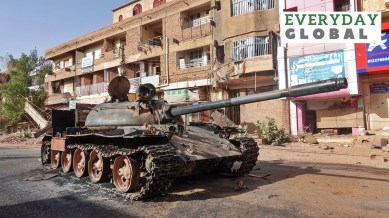A year after fighting broke out in Sudan, what is the state of the conflict?
Just a few years ago, Sudan seemed on the precipice of peace and change, after 30 years of authoritarian rule. What went wrong?

Diplomats met in Paris on Monday (April 15) in order to raise humanitarian aid for the northeast African country of Sudan, which has faced conflict for a year now. Just a few years ago, Sudan seemed on the precipice of peace and change, after the three decades-long regime of dictator Omar al-Bashir was ousted from power.
However, fighting broke out in the country last year among rival groups who are vying for power. On April 15, the Indian Embassy in capital Khartoum issued a notice to Indians to take “utmost precautions.” Several Indian workers, particularly from the Hakki Pikki tribal community from Karnataka, were in Sudan at the time.
Why is Sudan at war?
Sudan is seeing violence and fighting among groups amid an attempt to transition its polity from an autocracy.
In 2019, military generals ousted Omar al-Bashir amid a popular uprising. People within the country and major powers were critical of his rule on account of corruption, rising costs of living towards the late 2010s, and repression of social groups.
As The Indian Express earlier explained, “Between the years 1992-1996, Sudan also played host to Osama Bin Laden who had heavily invested in the country’s infrastructure at the time.” The US then declared Sudan as a “state sponsor of terrorism” in 1993 and the United Nations imposed sanctions on it the next year.
After his regime was toppled in 2019, civilian groups and the military decided to share power and an agreement to the effect was signed. Abdalla Hamdok was appointed the Prime Minister until elections were held.
However, a military coup under General Abdel Fattah al-Burhan and General Mohamed Hamdan Dagalo, head of the paramilitary Rapid Support Forces (RSF), took place in 2021. According to a report in The Guardian, “The RSF was founded by the former dictatorial ruler Omar al-Bashir as an Arab counterinsurgency militia. Bashir wanted to crush a rebellion in the region of Darfur that began more than 20 years ago due to the political and economic marginalisation of the local population.”
The military coalition assured elections will take place and blamed the civilian groups for causing instability due to infighting. Critics believe that the military was reluctant to give up power to civilian leaders, having long played a role in Sudan’s political and economic affairs.
In April 2023, Burhan and Dagalo’s rift over the RSF’s role in Sudan came to the fore.
What is the situation in Sudan now?
The army is believed to have made several advances of late, having claimed territory in Khartoum recently. According to Reuters, Saudi Arabia and the United States led talks in Jeddah last year “to try to reach a truce between Sudan’s army and the paramilitary Rapid Support Forces (RSF), but the negotiations faltered amid competing international peace initiatives.”
“The US hopes for a relaunch of talks aimed at ending the conflict in Sudan and opening up humanitarian access soon after Ramadan ends in mid-April,” the report added.
More than 14,700 people have been killed in the war, according to Amnesty International.
An AP report said that the United Nations’ humanitarian campaign “needs $2.7 billion this year to get food, health care and other supplies to 24 million people in Sudan – nearly half its population of 51 million. So far, funders have given only $145 million, about 5%”.
Nearly 9 million people have been forced to flee their homes either to safer areas inside Sudan or to neighboring countries, according to the United Nations. This also poses a challenger to the larger region.